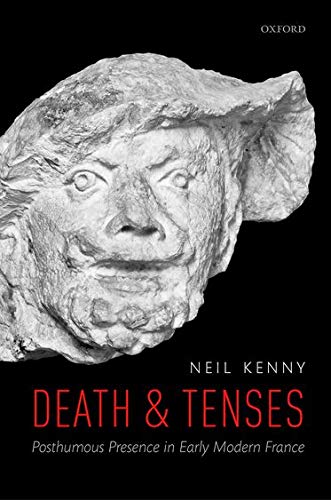All books / Book
Death and Tenses: Posthumous Presence in Early Modern France

| Full title: | Death and Tenses: Posthumous Presence in Early Modern France |
|---|---|
| ISBN: | 9780198754039 |
| ISBN 10: | 0198754035 |
| Authors: | Kenny, Neil |
| Publisher: | Oxford University Press |
| Edition: | 1 |
| Num. pages: | 320 |
| Binding: | Hardcover |
| Language: | en |
| Published on: | 2016 |
Read the reviews and/or buy it on Amazon.com
Synopsis
In What Tense Should We Refer To The Dead? The Question Has Long Been Asked, From Cicero To Julian Barnes. Answering It Is Partly A Matter Of Grammar And Stylistic Convention. But The Hesitation, Annoyance, Even Distress That Can Be Caused By The 'wrong' Tense Suggests That More May Be At Stake-our Very Relation To The Dead. This Book, The First To Test That Hypothesis, Investigates How Tenses Were Used In Sixteenth- And Early Seventeenth-century France (especially In French But Also In Latin) To Refer To Dead Friends, Lovers, Family Members, Enemies, Colleagues, Writers, Officials, Kings And Queens Of Recent Times, But Also To Those Who Had Died Long Before, Whether Christ, The Saints, Or The Ancient Greeks And Romans Who Posthumously Filled The Minds Of Renaissance Humanists. Did Tenses Refer To The Dead In Ways That Contributed To Granting Them Differing Degrees Of Presence (and Absence)? Did Tenses Communicate Dimensions Of Posthumous Presence (and Absence) That Partly Eluded More Concept-based Affirmations? The Investigation Ranges From Funerary And Devotional Writing To Eucharistic Theology, From Poetry To Humanist Paratexts, From Rabelais's Prose Fiction To Montaigne's 'essais'. Primarily A Work Of Literary And Cultural History, It Also Draws On Early Modern Grammatical Thought And On Modern Linguistics (with Its Concept Of Aspect And Its Questioning Of 'tense'), While Arguing That Neither Can Fully Explain The Phenomena Studied. The Book Briefly Compares Early Modern Usage With Tendencies In Modern French And English In The West, Asking Whether Changes In Belief About Posthumous Survival Have Been Accompanied By Changes In Tense-use.--publisher's Description. List Of Illustrations -- Abbreviations: Tense-forms -- Note On Translation, Style, And References. Introduction: Inescapable Tense. 1 Tense, Death, Survival : Modern Tenses For The Dead: Towards A Sketch -- The Historiographical Regime Of Disentanglement -- Surviving Death In The Early Modern Period -- Early Modern Tenses For The Dead : The Perfectum -- Time And Tense -- Perfectivity, Imperfectivity, And The Problem Of Perfectal Meaning -- The Passé Simple And The Passé Composé -- Patterns Of Usage. 2 Dying, Burying, Mourning: Tense And Ritual : Tense And Ritual -- Christ, The Saints, Meditation -- The Eucharist -- From Funeral Sermon To Coronation -- Epitaphs -- Consolation Literature. 3 Discursive Remains : Actions: Exemplarity -- History -- The Will To Write And Give: Postmortem Continuations -- Spoken Words -- Written Words : Ancients -- Moderns. 4 Authors : Rabelais - Montaigne. Conclusion: Breaking Through? Bibliography : Pre-1711 Works -- Post-1710 Works. Index. Neil Kenny. Includes Bibliographical References (pages 257-282) And Index.